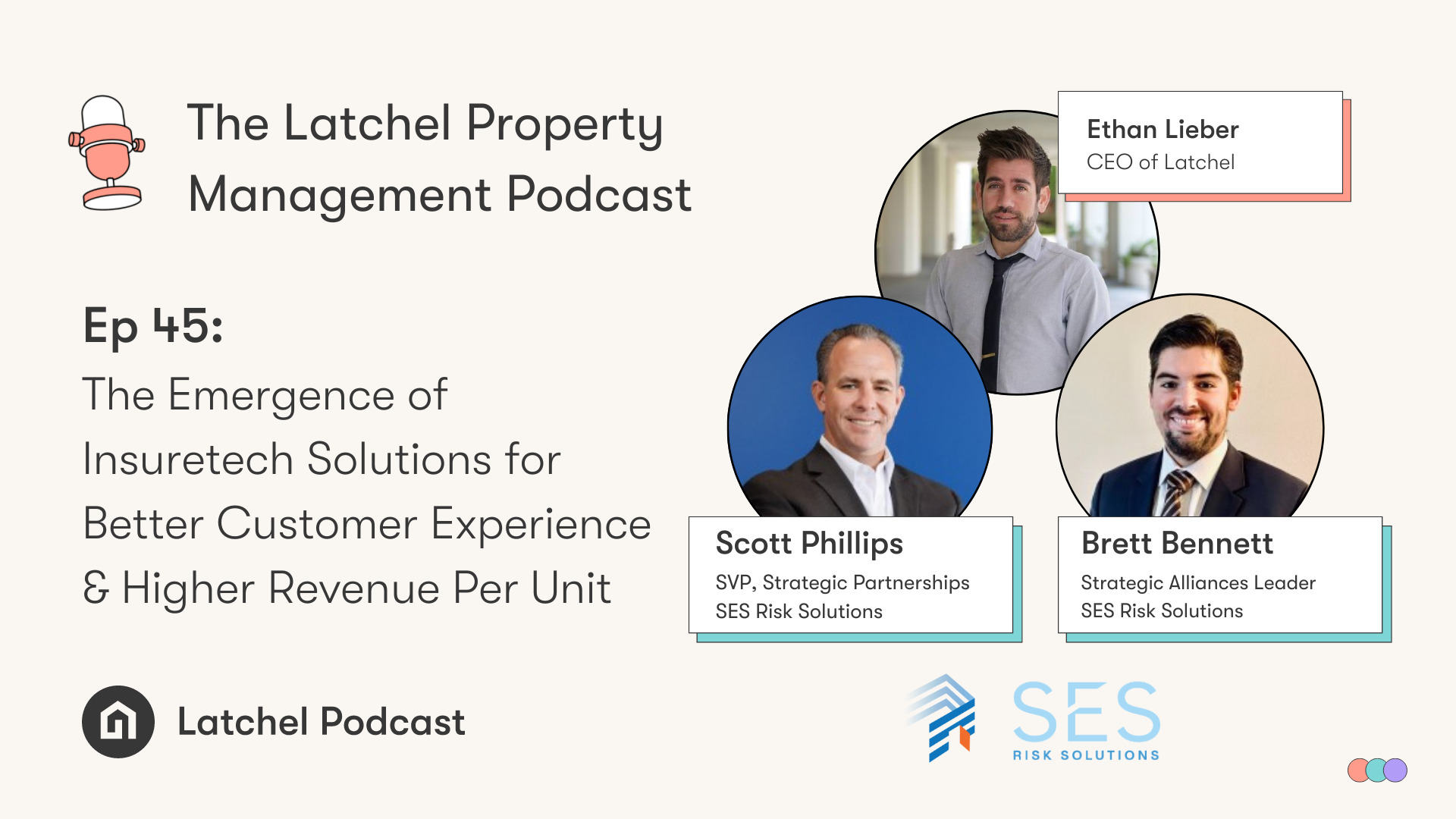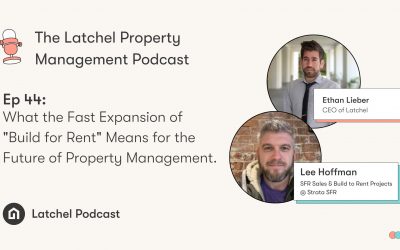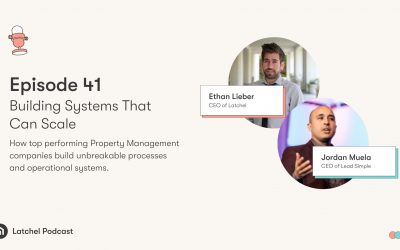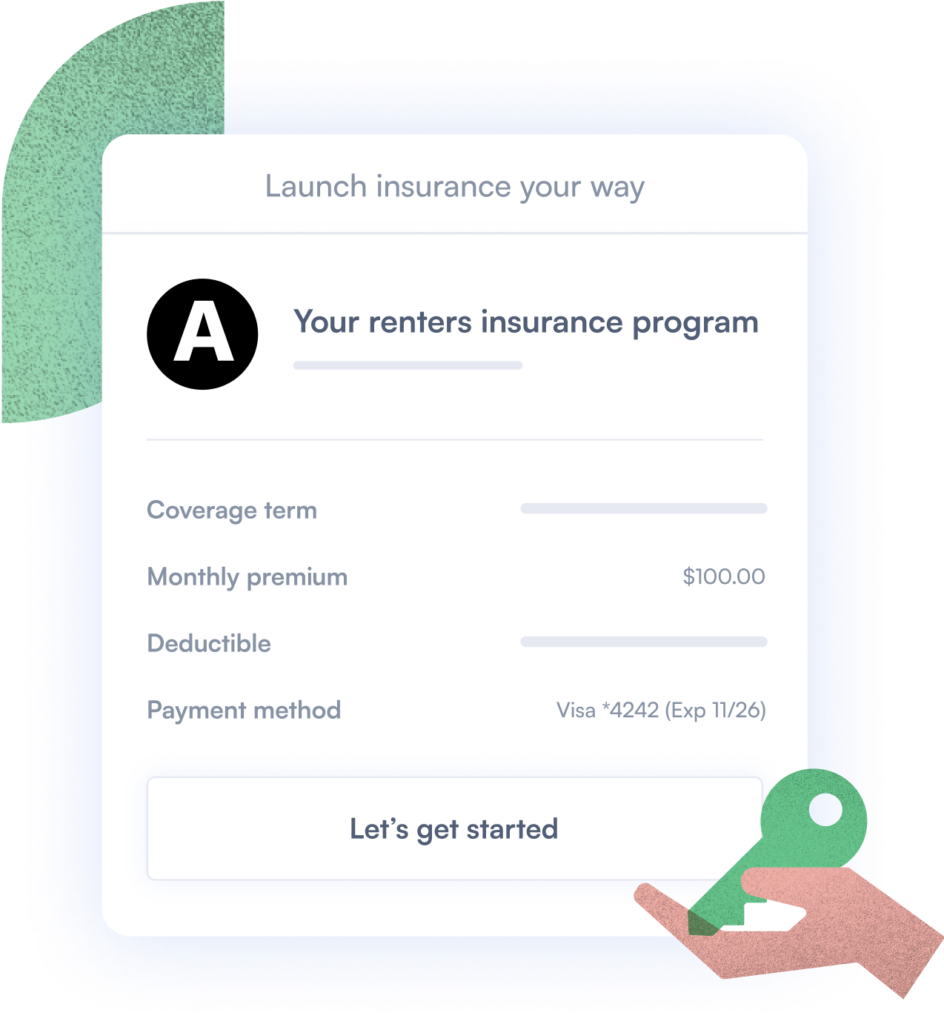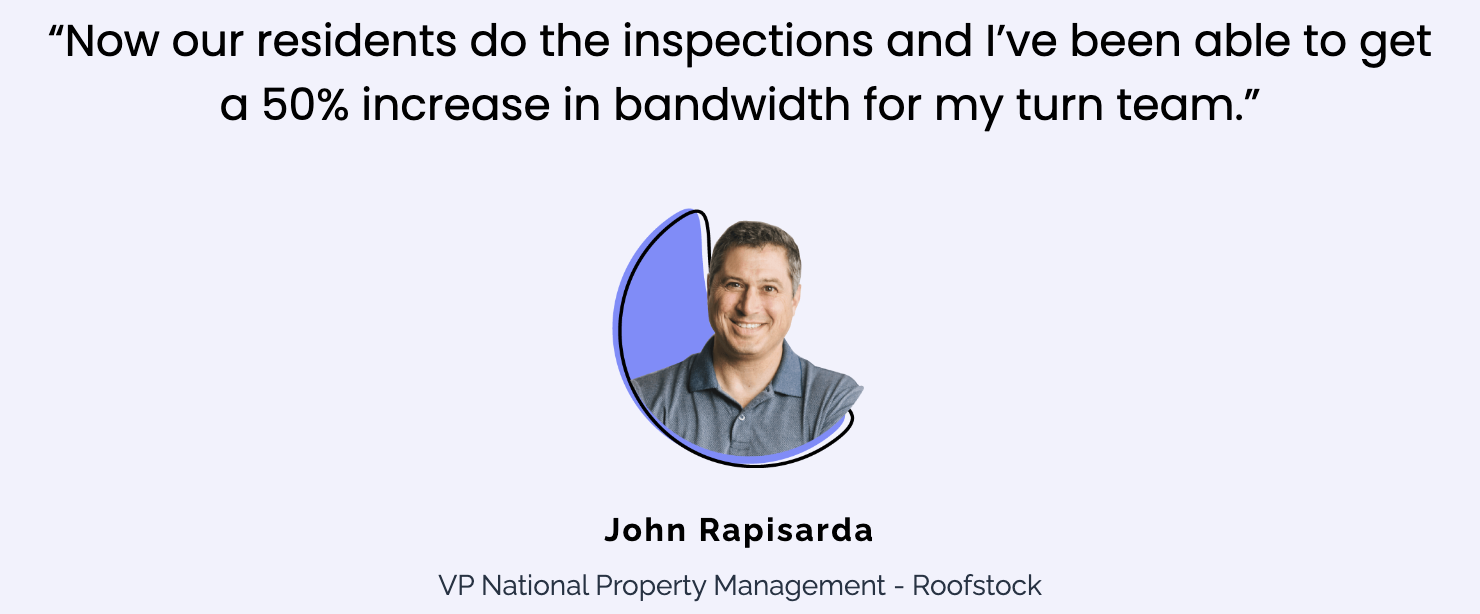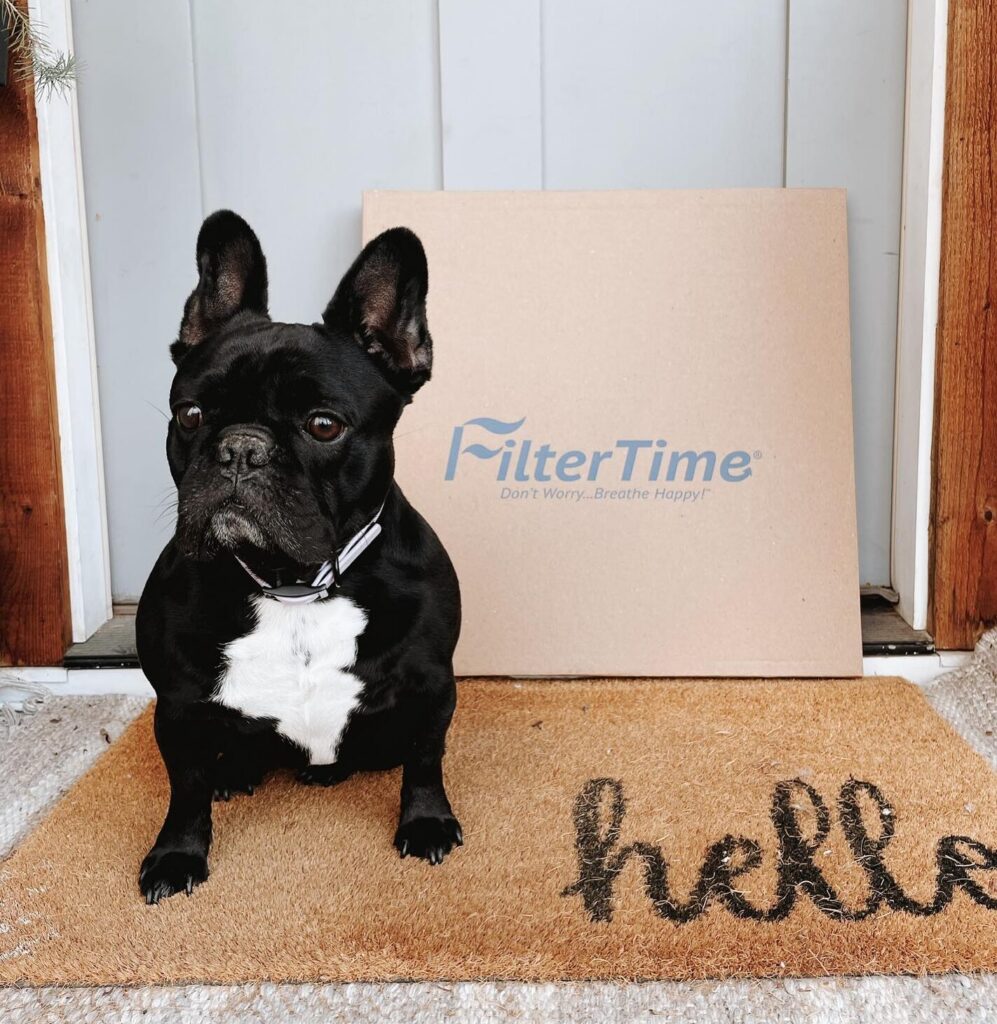Among the many things emerging in our industry, one of the exciting ones we wanted to focus on in this podcast is the emergence of integrated landlord insurance solutions in the SFR space.
Insurance? Exciting? We know it was rebellious of us to use the two words in the same sentence. But… in our conversation with SES Risk Solutions, we talked about how Property Managers can leverage insuretech solutions like SES to offer better landlord insurance products to owner/clients, and create additional revenue per unit.
In this realm, large institutional owners have always had the advantage, but SES is leveling the playing field and helping property managers beef their margins while doing it!
PS: Latchel has partnered with SES Risk Solutions to help curb rising property insurance costs for SFR Property Managers & Landlords… check out the press release here.
Listen In:
More of a Reader? Read the full transcript below:
Ethan Lieber:
Everybody listening welcome to this session. This is the Latchel property management podcast, and it’s years truly here, Ethan Lieber, the CEO of Lachel. And I brought in two fantastic guests today from SES Risk Solutions. We have Scott Phillips, who’s the SVP of digital integrations and Brett Bennett strategic partnerships leader. They’ve come on to talk about the emergence of integrated landlord insurance solutions in the SFR space. And we’re gonna talk about how property managers can leverage ensure tech solutions like SES to offer better landlord insurance products to their clients, to increase retention and create additional revenue per unit. So large institutional owners they’ve always had an advantage, but SES is leveling the plain field and actually helping property managers, beef their margins while doing it super excited to talk to you guys, welcome to the show, Scott and Brett.
Scott Phillips:
Thank you, Ethan. Appreciate it.
Brett Bennett:
Happy to be here. Thanks for having us.
Ethan Lieber:
So we’ve had plenty of conversations together. We’re doing amazing things together, but before we dive in, let’s give listeners just a little more insight into what SES is. Can you tell us what you guys do and why you do what you do?
Brett Bennett:
Yeah. Scott, you wanna go first?
Scott Phillips:
Yeah, absolutely. So SDS, I, I guess at the 30,000 foot level is a technology based insurance company focusing on ensuring real estate investor properties for over 30 years. So we operate in, in a more technical form is a matting gene general underwriting agency. So what that means is that we are the intermediary between the carrier and oftentimes your retail broker and, and act as the subject matter expert in that realm and focus specifically on real estate investor portfolios. And it, you know, real estate investment, property coverage in general. So that’s kind of the high level of who we are, what we do and, and what we’re focused on. We’re very, very niched and, and laser focused on the investment community.
Brett Bennett:
Yeah. And then to furthermore on that, we really started to dive ourselves into the property technology industry over the last few years. You know, it’s a, it’s a young industry it’s around 10 years old, that’s really been growing rapidly. There’s been a lot of investment into it. And, you know, insurance companies have always naturally been late adopters into new technologies and being on the forefront of ensuring these properties. We’ve started to see a lot of these companies pop up and the value that they bring to the marketplace and starting to look at the, you know, the data analytics and the, the, the machine learning that can come out of, you know, being able to track more historical data on properties with the emergence of property technology. And that’s sort of, that’s become an inherent advantage into the insurance side and moving more into the inure tech space.
Ethan Lieber:
Hmm, interesting. So there’s a couple things I want to tease out there, cuz I think some folks may have missed this. I heard that you don’t actually displace any broker relationship that the management might have, which might kind of initially seem confusing. Can you expand on that just a little bit, because I know from our conversations, like you’re kind of, you’re truly broker agnostic and you know, you can work with anyone and you can work with the exist. You’re very plug and play working with the existing relationships and management company has how, how does that work? Can you explain that a little bit?
Brett Bennett:
Yeah. Yeah.
I was gonna say, you know, we are what’s, you know, being a managing general underwriter, you know, 99% of our distribution is through broker relationships. So our role is to work with strategic carrier partners to put together an insurance, an insurance product offering that’s designed for this specific niche market. And then we work with our broker relationships to be able to deploy that product, to ensure landlords and property management companies that being said we are broker agnostic. So we have, you know, we work with any broker that’s that wants to come to us. That wants to get a quote if the property manager, if, if the property manager hears about our program through some prop tech solution and they have an existing broker relationship. Yeah, absolutely. We, we work with them every day.
Ethan Lieber:
That’s awesome. Yep.
Scott Phillips:
You know, and, and just to, to dovetail off that, it really when you look at the way the structure is for us, we are subject matter experts in this space from the carriers lens. And so we are not gonna pretend to be the subject matter expert at the insured level and know every nuance of every property manager. Everyone’s got a little bit of a different mix as a business and has a different way that they manage their properties and, and like to interact. And in all of those little elements, we definitely have, have a great lens to that and can bring a lot to the table, but we always wanna respect that boundary. So with a property manager, relationships are everything and that is including the relationship with their insurance broker. And it’s something that we can easily support and accommodate. So it, it doesn’t disrupt you know, the, the value chain that’s being exercised there.
Ethan Lieber:
And this probably helps us segue to the next question I had for you, which is to me, this sort of the way I kind of interpret this is like the CEO of a software solution is you’re really providing kind of this, this digital insurance solution that then you’ll, you’ll team up with a manager and their, their broker to actually offer out to, to a clientele. But maybe that’s a little bit off base. That’s kind of what I initially think of though, when I think of you as this integrated landlord insurance solution. So maybe you can, if, if I’m wrong there, maybe you can clarify and add some more detail. And at the same time would love to hear about, you know, as these integrated landlord solutions have emerged as a result of, you know, all this prop tech being born in the SFR space, like how, how is that, why are those being kind of emerging together and why are those growing in the management space together?
Scott Phillips:
Excellent question, Ethan, and, and I’ll take first swing at it and, and I’m sure Brett can probably round out the answer there. I think there is a, when we talk about integration, I wanna kind of take a quick step back into the first half of that question. And when you look at integrations, there’s a number of different ways you can approach it. And what I think we wanna focus on is how to add value when we integrate not just to be the convenient partner and make it easy. Yes, that is, I think why a lot of the driving growth is, Hey, centralized services make things efficient, optimize processes and, and automate processes where you can, and then where does this insurance piece fit in is to, you know, again, optimize and make it efficient, but to add value to both the end user, which would be the insured or the landlord, as well as the property manager and be able to bring additional scalability for them as well as diversify and improve sort of their offerings and landlord benefits. And, and, but I, I know you’ve got a lot to think about this and, and really driven a lot of these thoughts. What else would you round out on that piece of it?
Brett Bennett:
I think that really the, the, the emergence of the pro prop tech prop tech industry has brought this natural benefit to landlords in the eyes of an insurance carrier. It, when you are investing in techno property technology to protect your home or a technology like Latchel, when you know that there’s an emergency that needs to be handled right away, there’s an inherent value that comes to that. And as an underwriter, we can see that and we can take that and make a case for it and say that a per a landlord who’s investing in these services has a good understanding of how they want to protect their property. And it’s naturally creating less risk, which is more, which puts you in a better lens to the, to the carrier. So what’s, so really what it is is it’s almost a symbiotic relationship of providing value to where not only property technology is providing more value to residents through you know, resident portals and being able to communicate with your property manager easier.
But now there’s also an inherent side of providing value to the landlord. And I think that it’s a whole other side to the coin of where we’re looking at, where all this property technology has emerged of maintenance solutions. Let’s make sure the resident is happy. Let’s make sure that they, we can keep the tenants in and turn them over quickly. But now property managers have an opportunity to come back to their landlord and say, not only can we make your tenant happy, but now, Hey, we can start to reduce your costs on the overall care of your property and provide additional value to you. And I think that’s a huge win when you’re looking at the emergence of a lo of a market. And now we’re looking at the emergence of a second half of that market in more of a, an owner benefits offering that, that property managers can really start to dive into.
Ethan Lieber:
Yeah. So this is, I think, where things get kind, really fascinating for property management companies. So you, you kind of mentioned this prop tech has kind of changed the landscape on how these companies deliver value to residents, to the, the landlord, to even maybe third party vendors they’re working with. There’s been a rise in resident benefits of which like latch has been a core part of delivering extra services that can drive more revenue for managers. And one of the things that’s most fascinating about you guys is you’re coming in on the, the value to the landlord side. You’re able to leverage these prop tech solutions to drive better deals for landlords. And this is creating interesting opportunity for property managers because they can partner up with SES offer an very compelling, you know, probably lower cost, probably higher value insurance solution to landlords, and actually do it in a way where they’re creating revenue. Can you, so go ahead, give us a high level there on how does that piece actually work?
Scott Phillips:
Yeah, the, the one piece, I think that it’s been, it’s been happening on your, you know, large gigantic institutional. They have, have the size and capability to leverage their own portfolio and be able to you know, get access to rates and you know, the data that Brad had touched on, right. And being able to now have a little bit of clout with with an, you know, a carrier almost directly, in some instances, if they’re so large, but for the most part, the majority of this market space or this market are investors that own one to two properties. There is just not a, a way to scale them. You know, individually to get any type of benefit. Now, a property manager comes in and goes, I got a lot on my plate. I, I don’t want to have to go in and try to deal with this, but now the solution is you actually don’t have to deal with this.
You are simply now just a conduit to leverage your portfolio, that you are managing on behalf of all of these individual investors. So now you are taking a the ability, and now when you, you put in that other layer of lateral, now we’re taking lateral and demonstrating that we have an additional sort of like leverage point to now really make the, the value go all the way and, and compress. I, I think in a, in a way and flatten that playing field down, and that’s what we’re talking about because of the amount of clients that Latchel has, then you go down to the property manager. Well, now we have that built out internally with the algorithms on pricing and rating. We’re leveraging all of that from top to bottom to our carrier to say, this is a better clientele, and this is a better risk profile, which is what the interest there is.
So that is sort of the the, the optics and what we’re utilizing here and bringing to the table that has not been really done before, especially for your typical landlord has two properties or your property manager who runs a book of say 300 properties. It’s always been a headache. And, ah, gosh, because it is insurance companies and carriers are manual for the longest time. And so technology just was not an option, even if they wanted to consider an alternative sort of solution that exists here. We have this systems in play, and now we have the capability to do it where it does not eat the property manager’s bandwidth, and now is in an attractive offering.
Brett Bennett:
So to, to, and to dovetail off of what, what Scott said. So to, to give you like a real life scenario on this and play it through where we can just look at the value chain and the value waterfall from the property manager to the landlord and to the, you know, to us as the carrier to, to the prop tech company. So let’s say you have a property manager that has, you know a thousand properties, 900 properties. And as Scott had mentioned before, the average investor has less as one to two properties. Well, I don’t have a lot of buying power in the marketplace. I’m gonna get the off the shelf book rates where they’re gonna punch it in. And they say, here’s your quote, have a nice day. Well, as the property manager, because I have an invested interest in protecting this property, we can create a master policy and leverage the buying power of their portfolio.
So rather than going to the market with two properties, we’re going to the market with their 900 properties and saying, Hey, these are their 900 properties. These are their property management practices. These is, these are the tenant screening. This is the, the, their average tenant profile. They’re not renting to, you know, they’re not a slum Lord. They’re renting to good people. They’re using a key differentiator on why we wanted to partner with lateral is your emergency services response. We know the property’s gonna be protected if something happens because that’s when insurance is there for, it’s not there for planned things. It’s there for when things happen that are unplanned mm-hmm. And then we take that. As Scott had mentioned, we take that to the marketplace. And now me as an investor, I now have the ability to get the rating of what these large institutional companies are getting.
And as a property manager, I now able to offer that to my landlord. And then as a property manager, there’s, there’s a lot of other benefits that get, get to it. Tracking certificates is a nightmare. You know, you have landlords with a couple properties here, they have renewal dates on their insurances. You’ve gotta ma a guy that’s gotta go out for maintenance. You’ve gotta check and make sure that you’re listed on their insurance policy. In case the maintenance guy, something happens at their property. Now everybody’s on one policy with one renewal date and the property manager is listed as an insured on every single property that’s on that policy. So we remove that headache as well. And then the property manager is able to drive revenue by, through it, through, through the added value service of administrating the insurance.
Ethan Lieber:
Got it. So,
Brett Bennett:
And we would, yeah, so that’s kind of the value flow to that down to the, and all the way down to the landlord. Does that make
Ethan Lieber:
Sense? Yeah, this is beautiful. So basically, you know, I I’ve got nine, 900 and maybe it doesn’t even have to be 900 and I I’m sure our customer like anyone listening is probably now thinking like, oh, well Brett said a thousand. Does it work if I have 200 homes?
Brett Bennett:
Oh, absolutely. Yeah, absolutely.
Ethan Lieber:
So I’ve got 200 homes I’m managing or, or a thousand or, or somewhere in between, or, or maybe more I I’m ease and natural. I’m thinking, okay. I want, I want to provide an additional service to my owners. I want, I wanna give them better landlord insurance at better rates leverage my buying power when they come in, they say, Hey, Brett, Scott hooked me up with SES. What, what they’re, they’re after pictures that all of of the administration for that insurance is not taken care of, which for most property managers is like less overhead. They have to deal with. Now, before you had to deal with the certifications, making sure everything was up to date okay. The after that’s not taken care of because InsureTech and PropTech is a beautiful thing with beautiful automations that save you time. So you can focus on high value activity.
So you’re taking care of all that stuff. You’re providing better, more affordable rates to their clients, because if you’re buying power buying power management, plus their, you know, mitigating some emergency rescuing Latchel, and that all means something. So you’re giving ’em better rates, they can then pass those better rates with the better insurance to the owners. And the thing that really made my years pick up perk up was at the same time, you’re creating an opportunity now for the manager to make more revenue per unit. Can you ex can you explain that part? And typically what you see in terms of how much revenue a property manager’s able to create by doing this?
Scott Phillips:
So the there’s a couple of ways that a property manager can approach this and depending on, you know, and that’s where I think my earlier point is everyone’s got a little bit of a different mix and we’ve got the same sort of mix of solutions. So if they want to you know, be more in control of the billing aspect of it, where the bill is being sent to the property manager, the property manager is then pulling from the rent collected and, and kind of, you know, managing the accounting, which is a very typical process for some, and it’s very comfortable for them. It would be then an a, the addition to an admin fee, cause it’s what they’re charging for. And this is something that I think a lot of property managers probably have been very hesitant to even think about insurance, cuz they go insurance.
that sounds very legal. That sounds like I can get in trouble quickly. Cause I don’t know a lot of it. And there’s a lot of really confusing terms and, and contracts and stuff. I don’t want to touch it, but we’ve cleared all those pipes out completely. It is an administrative fee that they would be paid for billing and handling and managing that flip side is, Hey, I don’t want to touch it. I don’t wanna be involved in the accounting. Fine. We have the ability for our system to individually bill the landlord direct for their properties down to the asset level. So Ethan, the landlord has five properties with me. You get your invoice and bill for those five properties down to each individual property, it’ll say how much it is per month. Obviously the coverages will be a, a bit different Brett. The other landlord’s got 25 or 200, whatever it is that is all it, it is rent and repeat process, right?
So in that sense, this becomes a marketing generating revenue because what you’re doing is essentially saying, I will go ahead and bring these offers and allow you access to offer this to my landlord and they can opt in. And then what we have is a built in based on the size of who we’re reaching out to a marketing contract, it’s not a per policy. It’s not, if they sell, if they don’t sell, it’s a marketing fee that is guaranteed to the access. We know the statistics behind it. And we know that we’re gonna be made whole and understand how that works. So on average if you were to try to pencil it out, it works to be like a three to $5 per door. You know, if you want to handle the, a billing side, you can get down to a technical per per door fee or it is more of a, a little bit of a gray on a marketing and where we can we can, you know, make whole in that sense.
Ethan Lieber:
Yeah, let’s hone in on that first path, cuz I think this is the most interesting to, to our listeners, which is, you know, without the management kind of sitting in to really run all components of the property and provide a really like a full, robust service to the landlord. If they weren’t doing that, the landlord now has all this extra stuff they have to do to, you know, make sure that, you know, policies are staying active. And it’s, it’s a headache and they have to track it. And, and that, that kind of sucks. And if you’re a landlord and you’re going to a, a, a property management company saying, I don’t wanna deal with this, it’s, you know, kind of like, they’re ready to, they’ve already said they’re ready to pay. Right. They’re ready to pay more. They they’re gladly gonna put up the admin fees. So I think a lot of the listeners are thinking like, yeah, that first one Scott just talked about. That’s like the key path, cuz you’re providing all this extra administrative services and you should charge for it. Right. So it sounds like you you’re typically seeing for that first path that a property manager will charge anywhere between like three to $5 and then as administration fees for managing the insurance program for the properties, is that, is that close three to five? Is that typically what you’re seeing?
Brett Bennett:
Usually it’s around $5 a door per month, five bucks that, that they charge that they would just put, you know, add onto their, their management fees for on the administrative for managing the insurance billing.
Ethan Lieber:
And so I think like some folks might be a little bit kind of intimidated like, oh, do I really wanna have to administer this new thing? Like, you know, five bucks per unit per month. Like if you’re managing a thousand units, it’s a lot of money you’re talking, you know, five grand in new revenues every year. But when it comes to the actual work, I mean, do I have to hire a whole new person just to administer this now? Like what does that look like for the management company?
Brett Bennett:
No extremely simple. You just mark who who’s on the insurance policy, that’s being we have an online administration system where it pulls a report on a monthly basis. We break it out by insured and it tells you exactly what their monthly premiums are. If we can, it handles if it’s paid by a mortgage E and then, and a lot of that will be handled by the broker partner, whether it’s their broker that they’re using, or if, if it’s a referred broker that’s in we would train that we would work with them on their system. All of our pro most of our brokers are currently on it and we’re actually have, have a 90% retention rate of customers using it, but they can actually go in online and, and update properties, add, remove properties. So the property manager, when they get the new say, Hey Mr.
Landlord, I just bought a new property. Or Mr. Property manager, I just bought a new property. I need to add it to my services. They say, okay, they ping the broker with the address, the broker types, the address into our system. It automatically calculates the rate. And there’s actually a built in valuation system. And the policy is designed to meet all of the major lender requirements. So when they put in their lender as additional insured, or it automatically sends out the certificate, it takes a lot of that headache and burden away. So the landowner is not only gonna not have to deal with managing the certificate, sending it out to their lender figuring out if it’s gonna be paid mortgagey it can be paid monthly or annually. The broker will be able to repo a report or the property manager if they really want to get in there and, and use and, and charge more per door and really get in and use the system.
The system can be used by the property manager and then it there’s a built in valuation calculator per property. And let me, I’ll back up for a second. The, the way our, that our we work at, as se as underwriters is we’re not underwriting each individual property. When we look at a property management portfolio, what we’re looking at as, and as we said before, is we’re looking at the investor profile. What’s the property manager profile. What, what are their best practices? What’s their geographic footprint. And so we can take a property manager that says, okay, I let’s, I work in one state, okay, we’re gonna, we will give you your rates in one state. So anytime someone comes to you as a new customer, you can actually key in their address into that system. And you can say, Hey, if you want me to manage your insurance, this is what your insurance costs would be within as much fast as you can type and address into the system, you could offer a new pro prospective landlord, their insurance quote.
Ethan Lieber:
That’s
Brett Bennett:
Awesome. And so the other benefit to it is that that’s your insurance program. So, so that’s exclusive to you as a property manager, as a Al client. If they want to leave the property manager, they would’ve to go get new insurance. So it, it helps with, it helps with client retention, but you’re able to really pick as a property manager to go back to the revenue point is the level of service that you want to, how much hands on you want to be is how much revenue you wanna be able to drive from the customer, as far as the billing aspect, if you want to get into the, the administrate into the administration system. Does, does that answer your question a little more?
Ethan Lieber:
Yeah, that does. And I, I can see why folks might choose like that second method. That’s more hands off. Although I think anyone listening is of the mindset of full value chain create as much revenue opportunity as possible. So I think most of them will choose that first path and the fact that it creates like that client retention is huge.
Brett Bennett:
And I agree with you on that. I think that it’s we’re seeing, especially to be versatile in the marketplace between the small property manager, that’s got a small staffer. They say, I don’t want to take on that bandwidth, but I do want to drive some additional. And I, I like to call it bottom line income, cause you’re not really doing anything. It’s just it’s money in for, for implementing the program. Or if you’re alar or a medium, the larger size property manager that has someone that can spend 20 minutes every month to pull the report, then you can start to charge more. So I think that being able to be versatile and slide on that scale and our systems being able to handle that on our integration side is, is very beneficial as far as the revenue standpoint.
Ethan Lieber:
Yeah. I mean, I think like if I, if I was listening if I’m, if I’m a listener listening to this at this point, I’m probably thinking this, this almost sounds too good to be true, that you can offer this great service, create more retention, kind of customized unique solutions and make money from it and have it all almost be like turnkey. But I think the, the hitch here that most listeners will be thinking is, yeah, this all sounds great, but actually how many clients, how many landlords am I gonna be able to get to switch to this? So if they’re already using, if they already have some type of insurance, is it, is it really gonna be that easy for me to get them to move to the program? I spin up with SES. What do you guys think about that? I mean, like, what does the, does the landlord, is there a meaningful benefit they get switching. Is it easy to promote this out to, you know, your clients, if you’re a property manager and is there a certain kind of conversion rate you guys would expect a property manager to have?
Brett Bennett:
Yeah, absolutely.
Scott Phillips:
In all, all of these elements that you bring and, and I love that we bring up the, the challenges that come into mind, cuz I think that’s what the listeners are sitting there going, okay, this sounds great. But and then there’s three, four you know, different challenges that are coming up and you’re bringing up some great points. So to hit it straight away the property man or the let’s look at it from the landlord’s aspect. Okay. For a second, let’s just sit in their shoes. We have, we have built out the whole process, it’s plug and play and it is customizable for them to, you know, tailored, fit to them. It’s like, you know, here’s, here’s how it fits you. And it fits around you like a glove, but let’s sit in a landlord’s shoes for a second.
You get an email and that’s the tactic. We could either do it through a messaging if they want, if they, how, whatever their preferred channel of communication is with their landlord. Oftentimes it would be an email. We have a custom template essentially that is customizable, that is specific to the landlord. So like I said, we’re sitting in the landlords shoes, you get that email at 10:00 AM on a Monday. It says, Hey, here’s this new program. It’s great. And wonderful. Here’s the indication in the pricing. And let’s just say it does not beat the cost that are the price that I have on my properties right now for whatever reason. Well, that’s pretty cool. I’m, I’m happy. It’s it’s not a, someone’s gonna shove this down their throat thing. It’s Hey, we’ve got this, it’s here for you. We’re willing to take it.
And as a landlord, where’s the, I mean, I mean, from the property manager, you’re not gonna lose on the, the offer. Hey, here it is. Great. I got better. And I don’t like it. Thanks for, for doing that though. That’s pretty cool. You’ve already gained value by simply putting the program in front of them. We, from a penetration in some of the other aspects that you said from the other questions of it what we have seen historically is we would get an initial onboarding of about 15% trickling on and we’d get up to about 40% of the portfolio in most cases. Now mind you, we are only going into our second year of rolling this out with property managers and going in deeper. And that’s why this sounds too good to be true because we have skinned our needs. Several times fallen down on stuff and went, did not realize that.
and now we’ve got that solved and now we’ve got that fixed. And now that’s why we came into a more broader reach that we’re doing here and talking about it. So those are the, the elements of, of how the penetration would work. The other thing I wanted to make a point is it’s very easy because the landlord, you know what my policy doesn’t expire till March of next year. Let’s just say they get the email today. Right? Great. Not a worry because what we built out is something that no one else has. And that’s technically speaking a two year policy. So let’s say you start the property management me, it’s called a master policy. I don’t wanna get too far in the weeds cuz we can start losing people quick. But what I want to understand is that if you opted in Ethan, you opted in day one, Brett decides, Hey, you know what?
It’s day 360 of this offering. I wanna opt in. You both get a one year policy, so you’re not gonna be in the situation. Well, I opted in and now I have to go through some sort of renewal or whatever it is. So it allows the proper or the landlords to opt in at their convenience. They can cancel and move immediately and they say, Hey, cancel all this. The cost savings is dramatic. We’ve seen that, push it all into there or they say, you know what? Let’s just fold them in as these policies cuz most of the time it is a you know, a one off policies with these properties. They’re individual like as if it was their own home, but now it’s all centralized. The other aspect is landlord says, Hey, I want to buy I’m I’m going to buy two more properties right now.
Well that system instantly can get you an evidence of insurance. Now you talk about being able to move fast in a market that is requiring lightning speed. You instantly, I, I mean, within a matter of a minute or two can have that property evidence of insurance and you’re talking about getting funding, getting that done. So all thanks to who your property manager now, where is that property gonna end up? It’s gonna end up in the property manager’s portfolio to to go. So now you’re looking from a property manager. You might have properties that are with your landlords that are not in your portfolio. Now you’re gonna able to get organic growth interest from 16 clientele because I guarantee there is landlords that go, yeah, I got, you know, four properties with John property management and I’ve got another two over here with Tim property management, you know, just given arbitrary example, man, John came with me with this opportunity, you know, I’m just gonna move them all with John. And now you just got yourself instead of having to go win a new landlord, you got organic growth out of your existing clientele and grow and we’re able to grow your book there while making a marketing revenue on each policy.
Ethan Lieber:
Yeah. So if, if I kind of backtrack here, it sounds like right off the bat, typically you’re gonna get like a 15% conversion, just immediate pop in revenue, across 15% of those properties. Cause you did a little bit of marketing and you immediately got people to switch. Then over the course of different policies, expiring properties coming on new clients that that’s gonna roll up to 40%. Maybe, maybe you get up to 50%. And it sounds like that’s sort of ends up being a steady state except that there’s this viral growth, organic growth component that as all those people that have opted in either purchase more homes or they have maybe other homes on their books that you’re not not managing the rates are so good. They move those over too. They all come on the same policy and you’re now making more money even on homes that you might not be managing. Is that right?
Scott Phillips:
Well, you weren’t previously managing, they, you have to be managing them to move the, to, to be able to have that insurable interest. So that’s what I’m saying is that if you, if you have a landlord that has two that are outside the, the portfolio they say, Hey,
Ethan Lieber:
Maybe they bring them on.
Scott Phillips:
I want, can I get my other two insured? Yeah, exactly. So you can imagine you get that phone call and go, Hey, I have these two other properties and property managers going, I didn’t know. You had two more properties. Yeah. Can I get the, the, these covered as well? They have to be under my book. So gives you the property manager that leverage point to be able to, to command more business to say, yeah, absolutely. You could take advantage of this program, but it’s at the end of the day, it’s my program as the property manager, it is my program which
Ethan Lieber:
Is huge. It become like a lead gen opportunity in some ways, because the rates are so good. The product’s so good. They look to get on it and then you find out, oh, there’s actually these other units that maybe you’re not managing. That’s really interesting.
Scott Phillips:
Yeah. Yeah. It was, it was something that I gotta be honest. It was an aha moment that we got as feedback and went, whoa, wait a second. It was like, you know what? This is great. I actually was able to grow one of my landlords you know, the book of business that I have with them. I was able to grow that business and we went, huh, okay, didn’t see that coming. That’s pretty cool. That worked out that way. So, you know, sometimes the opportunities we don’t always see ’em in front of us and, and can state them up front. And it was one of those back end like that worked out pretty well. And it’s something we, we definitely wanted to share.
Ethan Lieber:
Are there like interesting tactics you’ve seen property managers do to get beyond a 15 50% conversion, like as their policies from their current customers expire? Like have you ever seen someone get to like a 90%?
Scott Phillips:
So we’ve seen consistent growth with our property managers in the portfolio. I, I, I don’t know if there’s necessarily a silver bullet because the one thing we want to continue to preserve is no one wants to be sold insurance, right? No one wants that feeling of being sold. The property manager is not interested and legally cannot sell insurance. But what is been beneficial is to roll this out in every periodically, Hey, don’t forget we do have this this program. So it’s something that you have to kind of keep fresh in the minds of your landlords. And that’s where you start to see that incremental growth that just steadily builds upon itself. And then as the renewals and, and it just starts to continue to stack. So I would say that the, the consistency of messaging that, you know, in your engagement and just saying, and then when you bring on your new clientele, this is part of your owner benefits package.
We have this, we have lateral, we have, you know, right down the line, we also have this master policy program in which you can plug and play your properties in. And this is how it looks. The nice part is is that if they ever feel like there’s a conversation, that’s too insurance driven there’s it’s too technical coverage amounts, whatever it is, that’s where the broker that we have plugged in, whether it’s their own property, you know, broker, like we said, we’re truly agnostic. Or we have designated partners that we have that are on, you know, kind of sitting in the bullpen if you will. Right? So we just plug and play. They know the systems, they know the conversations and it allows the property manager to again, not get their bandwidth eaten up and say, Hey, if you want to discuss this program in depth, these are the individuals to speak to. And that covers them from a legal and compliance perspective, which I think is important. And I don’t think we really quite hit on, but we’ve cleared them of all of those risks in, in potential issues. And meanwhile, we also say, look, that conversation can get very long. You don’t have time for that Mr. Property manager or Mrs. Property manager. That’s why you transfer that conversation off. Yeah. And allow that to be facilitated.
Ethan Lieber:
So it’s, it’s completely turnkey. I mean, as a property manager, you’re not, you know, exposing yourself to have to deal with all this questions and all kinds of things with the insurance ins and outs, it’s really about offering a better product at a better price. And being able to create opportunity with an administration fee because you’ve got access to all the properties, you can directly plug them in through some automated technology solutions and boom, you know, how this crazy high value program. I love the thought of baking it in as an owner benefit. I mean already, like you’re gonna get a ton of stuff with you know, property manager, that’s using products like Latchel and enhancing the way that property’s managed for the owner. But then to be able to have this benefit of, Hey, you switched to me, you’re gonna get better insurance rates.
I, I manage everything. It’s all administered by me. You don’t have to worry at all. I love that. It seems like a, in terms of the marketing too, I’d imagine I’d tell him if I’m wrong here. That because the property manager knows when maybe other policies are expiring, they can come in at a good time and say, Hey, your policy’s expiring. Let’s move you to, you know, my company’s policy where you’re gonna get better rates, better coverage. Do you see that often where property interests just automate kind of some marketing when the, the preexisting policy is gonna expire to get them moved over?
Scott Phillips:
Absolutely. There’s actually two there’s two entry points on that one. Yes. A hundred percent. If a property manager is properly tracking and making sure that they’re listed on evidence of insurance, then they’ll know the expiration date. So they can come in and say, Hey, you know, we have this offering you know, it’s gonna be expired if you’d like, and you don’t want to go through or deal with renewal because you don’t know what’s happening on the other end. I, I think from just a, a quick, just jump back in the industry of insurance the market is hardening. And what that means is prices are going up all over the place. And I, I know everyone wants to rip their hair out when you hear that. Cause you’re like, oh, inflation, let me guess. It’s like, it’s insanity. Right? But at the end of the day, what is driving the increase in pricing out there in our world for insurance is all the increased cat activity, which is the catastrophic activity, the, you know, the, the, the storms and the, you know, hurricanes and the, this, and then that and all that kind of things.
So all of that from a much larger perspective is saying, Hey, we’ve gotta drive the prices up because we’re having a lot more claims. So what could happen to the individual investor is their property insurance just got through the roof. There may, they may not think there is another option. They may have forgotten about it. So that’s where we were saying that timeliness and staying fresh with the client is ideal right there and, and be unable to put that in front of them, again, just going, it’s here for you if you want it. And that kind of it’s something that just kind of popped in my head. It’s like, Costco, you go to Costco because you can get great deals and all that kind of stuff. And then it’s like, Hey, we sell gas too. You know, you never initially thought, well, I wanna go get gasoline at Costco.
It’s like, no, I need my lifetime supply of toilet paper and, you know the giant pack of burgers, but then you’re going on the way out. And you’re like, well, that price on gas is pretty good. I think I’m gonna GRA you know, I think I’m gonna go fill up real quick. I kind of feel like there’s a little bit of that synergistic element there. It’s not like they’re saying you cannot shop here unless you go get our gas, you know, and that’s kinda the same thing with the insurance. It’s like, it’s pretty dang good. And it’s, it’s tailored right to it. You can, you can jump right into it. The other part of it though, going back to way you can where landlords can opt in is if you’re trying to track the certificates and property managers, I think really struggle with this.
And let’s just say, I don’t know, you’re struggling con I don’t know where my certs are. I don’t know. I, I don’t know how to get you added. Some carriers will not allow it because they’re on the wrong type of policy. I’ll keep it very, very generic there, but there’s a lot of nuances there, but they are on the wrong type. And so the carrier goes, no, we’re not adding your property manager to it because that’s just not allowed in our, you know in our policy. Well, you can turn around and say, look, I’ve gotta be on this policy. And it’s not because you’re, you’re being, you know, over the top or like that it’s to protect you the property managers,
Ethan Lieber:
If you’re not on it, then it could end and you have no idea. And now your client is completely exposed
Scott Phillips:
As you are the landlord
Ethan Lieber:
As the property manager could be too. Yeah, I guess yeah.
Brett Bennett:
And go for really quick. I’ll let you, sorry. I just interject really quick. I’ll let you go back to what Scott, but you know, as a property manager, if you have a maintenance guy that’s out on site and he doesn’t realize the tenant’s home and there’s a liability claim and you didn’t have updated certificate, that can be a nightmare for a property manager. So back to with what Scott’s going towards is with this policy, it’s a, the property manager is listed on every property in that group as an additional insured or, or, or as an insured on that policy.
Ethan Lieber:
Yeah. That’s awesome. That makes it way easier for them. They don’t have to worry. They don’t have the stress of having to track all these certificates separately, dealing with outside insurance
Brett Bennett:
And, and you’re reducing your liability.
Ethan Lieber:
So I we’re jumping like all, all over the place, but sorry. And well, I have to apologize cause actually I for all listeners I Brett and Scott basic thought, I was gonna start asking them about how these policies work at the end of this show. And I basically jumped in right at the beginning on like how this stuff actually works. Mainly cuz I think like this is like for all the folks listening, they’re like we want the Jews give us the Jews now. So I hope, love it. Be satisfied, your thirst for all the, all the listeners. I think like I’m gonna kind of backtrack a bit cause there, there was a question I told you before the show that I was gonna ask that I haven’t asked yet, but I think it’s relevant to something. Our listeners are probably thinking, which is, Hey, if I’m creating revenue with administration fees, it seems highly unlikely potentially that I’m gonna be able to get a cheaper price for my clients. How’s it possible that I can create admin fees and still have better prices and better products for them. And this is where I think like we should connect a bit on why the lateral SES partnership is interesting. Can you guys talk a little bit about like why you partner with companies like Latchel and what that partnership actually enables for the property managers that are using both of the services?
Brett Bennett:
Yeah, absolutely. So and let’s and to let’s really drive that home. So as an underwriter, we’re looking at, and we’re, we’re putting together a portfolio for a property manager, right? They have the, the insurance term is care custody and control of that property. And so if I’m an insurance company, I need to make sure that if I charge, I have to set a premium to where, where I am bringing in enough money over time to where if something happens to that property, I am either level or I, or I didn’t lose money on it. And with the emergence of PropTech and specifically Latchel, and we’ve been watching this in the property maintenance side, we’ve looked at other companies we’ve, we’ve looked at different other solutions that protect properties, but ULA is a key differentiator in the emergency side of things because stuff happens to properties.
Real real life happens, little things get damaged. You don’t really use your insurance for that. You use your insurance for a catastrophic scenario, right? When something is going to damage the property to where the tenant’s gonna have to move out, it’s gonna be a headache. You’re gonna have to have a, a, you know, abatement work. There could be mold if, if water has been sitting there too long and then that’s a nightmare and you’ve got all and, and now you’re just losing revenue on that unit, right? And you’re still paying your property manager and you’re still paying for the for, for the mortgage on the property. I mean, you’re just out cash and cash flow is king for these guys and the laches emergency response technology and our integration ability in the Latchel can notify the landlord immediate or immediately that, Hey, there has been an emergency at your property.
Do you want to file the insurance claim? Yes or no. And if in that way we can have a claims adjuster out there significantly faster and people are saying, okay, why is the claims adjuster important? The claims adjuster has to get there first, before we can start working on repairing the property. So if we can get to them and shorten that window time, there’s less chance of mold. There’s less chance of damage to the actual structural structure of the building. The it’s an exponential difference in what could possibly go wrong when there’s emergency event that could cause structural damage to a property. And that is why we chose Latchel as a key partner in putting together this program and property managers that use Latchel will see up to a 20% discount on their overall insurance rate. And so when we’re talking about the landlord insurance and the value of the partnership is not just purchasing convenience, this isn’t just for them to come in and say, Hey, I can get insurance cheaper.
This is saying, Hey, we have partnered with a company that will help, that helps protect your property. And I’m saying that as the property manager, so Mr. Property is, is partnered with launch with a company that will help protect your property. And when, if, if hopefully it doesn’t something terrible happens, it’s going to get fixed or fixed faster than it would normally in the open market. We, as an insurance underwriter see huge value in that. And because of that, we’re able to offer up to a 20% discount for latch for property management policies using latch customers, sorry, my mouth is getting dry. And that is sign way more significant than the $5 that, that they’re gonna charge per door. Does that answer your
Ethan Lieber:
Question? That was a beautiful answer to my question and I, I I love the, the flattery of, of LA the efficacy of our service. Thank you for that. I wish I asked that question right up front, even though people would have no context on the answer. So I think we had to go through the journey to get there, but that, that was awesome. And I think you did a great job kind of capturing why it’s, why it’s good for the management, because they’re now able to still offer services that are gonna be cheaper. The product’s going to be better and it’s almost it’s. You can almost kind of see it as sort of a somewhat arbitrage opportunity that the property manager has to create administration fees, but still have a product that’s gonna be more affordable to the landlord than they would’ve otherwise. It’s like, you’re, you’re talking about both parties winning.
Brett Bennett:
I see it as a win, win, win. I mean, it’s, what’s a win, win, win, win. It’s a win for the property manager. It’s a win for the landlord. It’s a win for landfill. It’s a win for, it’s a win for us as the underwriter and carrier because we’re ensuring properties that we know are well protected. And in a world where catastrophic events are happening, more and more as Scott had mentioned, property rates are not just going up because of the cost of materials. It’s unfortunate, but there are more natural disasters and their insurance companies have to bring in more money than they put out. Otherwise they go out of business. We’ve seen it with companies with the, with the California fires small insurance carriers that have just gone completely belly up and people are left with their hat in their hand.
And it’s so how can we mitigate these rising costs to landlords who, where it there’s, it it’s tough to get properties right now. You want to go out and you want, you’ve got cash and you want to be able to be swift in the market. We can issue, as Scott had mentioned before, we can issue the certificate immediately on these group policies. So we can speed up lender funding. You’re getting reduced premium. You’re part of a group group pool now. So now if you do have a claim on your policy, your rates, aren’t gonna skyrocket, it’s leveled out by the pool, the, the pool of the insurance property manager and the other properties that are on the profile. So it’s, it’s really taking a lot of that burden if something terrible happens off your plate.
Ethan Lieber:
So I’m gonna, I’m just like have this burden curiosity because Scott, you mentioned this Brett, you’ve now mentioned this about rising costs, more, you know, natural disasters impacting the pricing of insurance. So you, you can just answer this as a yes or no, or, or, and I don’t know, is global warming good for insurance companies like SES or not good?
Scott Phillips:
Oh, absolutely not. It’s it is not good. I I’ll just give you the, my, my joke that I always kind of raise myself is that insurance is the only business and the entire world of all industries that sells a service that doesn’t want you to use it, think about that, right? Cause if you use insurance, it’s a claim, which means money’s paid out, obviously that’s the point and the intent of insurance, but the ideal scenario for every carrier is to go. We wrote all these policies and nobody had a claim awesome. That is the profit margin of a lifetime. So global warming and all of that is just completely compounded and made made things very, very difficult. And I think kind of tying back to like it, that’s not, that’s not a that’s not just a complimentary you know, dialogue about lateral just because we’re on your podcast.
We literally went to a, the carrier and spent time and sat down and put into algorithms and statistically modeled the benefits of how this works. So it it’s, it’s truly it was it’s statistically proven of what your service is capable of doing because of the time that’s cut down and, and all these things that people that know math better than I could probably ever realize were able to really identify. So that’s where that cost is. And, and I think that the rising cost going back to global warming is, is actually now having to be beared by all parties, by all of us, anyone that has homeowner’s insurance to ensuring your, your rental property, you’re bearing the cost of all of these elements. But now if you can step inside a safe little bubble and say, Hey, we’re, we’re not gonna get, you know affected by that nearly as much. You you, you really get a, a, I think a, a positive turn in that value, add that we’re talking about that changes the, the, the dynamic of how we look at it and how carrier our carrier are approaching it. And now we’re approaching it. And subsequently even, you know, retail insurance brokers can approach it with their property managers.
Ethan Lieber:
I I’ll say too. I didn’t ask the question to talk about global warming, but part of the reason I asked was I got this sense that, that, that, that change globally. Isn’t good for anybody. It, it’s not making insurance companies more profitable. It’s obviously not good for homeowners that are dealing with more fires, more flooding and things like that, but I wanted to ask it because I think folks, when they see these rising prices in the back of their head, and this is my default, I’m always like, oh, there’s the, the big insurance company trying to just make more money, but really that’s not what’s happening. It’s, everyone’s kind of just trying to hit that baseline and adjust based off like where the world is moving.
Brett Bennett:
Yeah. You know, and, and really the, the joke in insurance is if you go to school for mathematics you can either be, you can work for an insurance company or you can be a math professor. So they, they run on all algorithms and BA it’s there, the insurance com there’s an insurance commissioner in every state that only allows you to raise rates by so much. So they have to petition every year on why they need to have the rate where it is. So it’s not insurance companies aren’t allowed to just Jack rate. They actually have to have it approved. And unfortunately they’re, unfortunately they’re not currently not able to raise rates fast enough to recoup for some of these large losses. So it it’s unfortunate, not all around.
Ethan Lieber:
So we’re coming up on time here. I have two questions left. One is sort of an impromptu. It’s the one thing we haven’t talked about, but I think the, the, the remaining thing that might make a management company say, Hey, I’m gonna push this off. And it’s how easy is it? And how fast can a property manager spin up this surface and get things going with you guys. Can you like maybe one minute, just race that,
Brett Bennett:
Yeah. Real quick, four easy steps. Basically. It’s just one quick data collection of an Excel spreadsheet of the list of the property addresses with the owners entities attached to ’em, it’s an individual or an LLC. If they send over their packet of their property management agreement, their lease agreement, their tenant screening, you know, just their basic, any new, new customer packet on the resident side and the landlord side we take it out to the marketplace. It’s usually a three to five day turnaround before we have the program ready to go. Everything is all set up. As far as the marketing we work with them. Everything’s pre predone pre they can tailor as much as they like to their, to send out through their system. We find better conversion when the, the marketing comes through their email versus ours. Mm-Hmm and then all communication is then directed to the broker partner for when there’s inquiries. So, pretty much the property manager just has to give us a little bit information and we have a, a canned email merge that goes out that they click send.
Ethan Lieber:
So get an Excel spreadsheet over, take a break for three to five days, have a couple beers connect back with you guys. Get the email template for the email marketing, set up, click the send, boom. You ready to go?
Brett Bennett:
Yeah. Owner option via a one click or they, they ring the the broker party for questions they may have, and they’re good to go. And then certificates go out and the broker the, the servicing broker will help ’em cancel their old policy, but as far as when the property manager’s seat, yeah. They can kick back and have a beer.
Ethan Lieber:
All right. Well, any for any listeners, especially if you’re using LA and looking at ways to create more revenue, sounds like this all starts with a half hour quick meeting with Brett and Scott. Guys, let’s, let’s take it home. Tell people how to get in touch with you.
Brett Bennett:
Absolutely. So you can reach us@partnersatses-ins.com, or you can reach us on our phone line at (657) 261-2470. And then that reaches both Scott and myself.
Ethan Lieber:
Beautiful. And if anyone’s at Al customer, or even if you’re not a customer and you want help getting back in touch with Brett and Scott just hit us up. All right, guys, thank you so much. And for all the listeners, thank you for tuning in. It was a pleasure. If you’re interested in more topics on property management growth and scalability, head over to lateral.com and subscribe to our newsletter.
Scott Phillips:
All right. Thanks so much.

